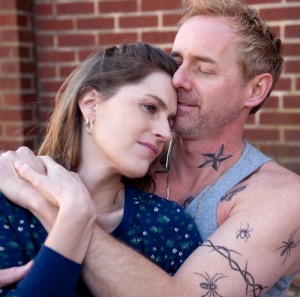The watershed moment in Joe and Janet Brady’s ostensibly happy marriage comes when Joe returns home from Ireland’s 1990 World Cup defeat to viciously attack Janet.
Sebastian Barry’s “The Pride of Parnell Street” is harrowing stuff; a tale of love perhaps never completely lost, and redemption. The couple’s turbulent history is methodically revealed in alternating, interwoven monologues by Joe and Janet. It is more like picking at a scab than exposition.
The events of “Pride” unwind against the backdrop of an ever-changing Dublin, and Joe and Janet’s story has a distinct, direct Dublin accent—about as subtle as a brick tossed through a shop window—and yet it remains delicately nuanced, darkly humorous, starkly beautiful. In Barry’s hands, a New York Times reviewer noted, this “rambling, vernacular talk assumes the music and patterns of poetry.”
Harriet Power was one of the first to read some of Barry’s powerfully moving lines. Power is a professor of theatre at Villanova who befriended Barry when the playwright served as the Heimbold Endowed Chair in Irish Studies at the university in 2006. They became good friends during his stay, and one day he asked her if she wanted to read a first draft of a new play—this new play, as it turned out. The language and emotion, she recalls, fairly leapt from the page. “I said, before I die I will do this play.”
Power’s bucket list wish is being granted. Wearing her other hat—associate artistic director at Act II Playhouse in Ambler—Power is preparing to bring this penetrating play to life later this month. David Whalen portrays Joe; Kittson O’Neill, in her Act II debut, plays Janet.
For Power, her friend’s use of the language is transcendent. “He’s really, really good at capturing what the soul sounds like,” she says. “He captures the poetry in the everyday without seeming to do anything at all.”
Of the two, Janet is the more successful survivor. Joe has weathered countless failures and indignities, and spends the play speaking from a hospital bed.
What appealed to O’Neill about her character was the shining spirit that lay beneath surface ordinariness.
“She’s a cleaning lady in a factory,” she explains. “She’s a single mom with two kids. She does not bear the external markers of success. What makes her exceptional is that she has a mind that is wide open to the world and the joys in it.”
Clearly, the deeply troubled Joe obviously is least sympathetic. Says Power, there is something about him that says, “I dare you to feel anything but repelled by me.” But even here, she adds, Barry has left open the possibility of forgiveness, if not a second chance—even when you’ve really blown it.
Whalen concurs. What Joe has done, he says, “was a terrible mistake. It (domestic violence) happens more often than we might say.” Given the nature of that “terrible mistake,” he adds, it’s difficult to see how any of it could end on anything other than a dismal note.
And yet, some sparks of love still unite this couple. For Whalen, that is what most appeals to him about “Pride.”
“For me, this play is such an incredible, transcendent love story,” he says. “When I read it, it blew off the pages for me. The last moment of this play always gets to me.”
And we’ll leave that last moment for you to discover on your own.
The show runs from March 22 through April 17. Details here.

